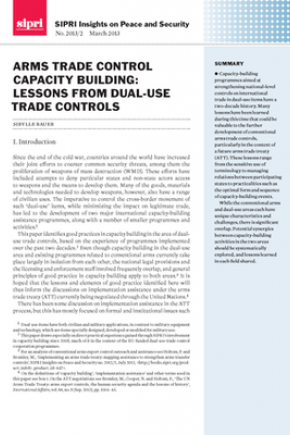Arms Trade Control Capacity Building: Lessons from Dual-use Trade Controls
For any multilateral arms trade controls regime to be effective, there must be capacity-building cooperation between the participating states—to share learning, to coordinate efforts and, most importantly, to help states with less developed trade control systems to bring their controls up to standard. The experience gained in two decades of capacity-building cooperation in the area of dual-use trade controls has much to offer in this regard.
Many of the lessons learned in dual-use trade control capacity-building are directly applicable, or at least instructive, for the conventional arms field. This SIPRI Insights paper seeks to identify and elaborate the most important transferable lessons from dual-use trade control capacity-building cooperation with a view to informing the ongoing negotiations towards a global arms trade treaty.
I. Introduction
II. Recent developments in strategic trade control cooperation
III. Dual-use trade control capacity-building programmes
IV. Relevance of dual-use experience to arms trade control
V. Lesson learned for capacity-building cooperation
VI. Conclusions

